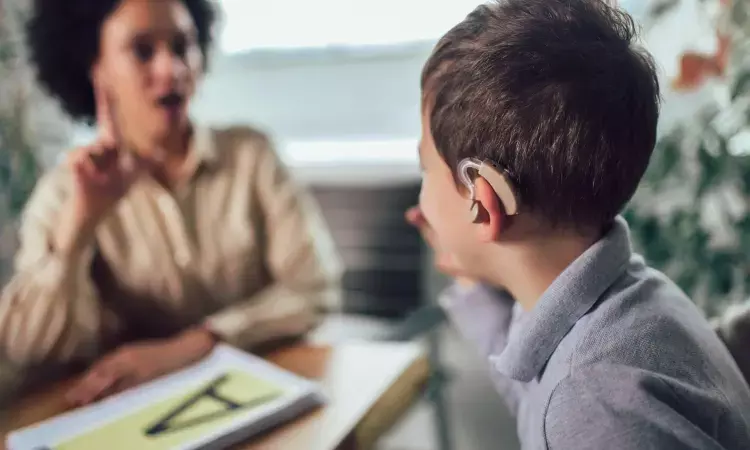- Home
- Medical news & Guidelines
- Anesthesiology
- Cardiology and CTVS
- Critical Care
- Dentistry
- Dermatology
- Diabetes and Endocrinology
- ENT
- Gastroenterology
- Medicine
- Nephrology
- Neurology
- Obstretics-Gynaecology
- Oncology
- Ophthalmology
- Orthopaedics
- Pediatrics-Neonatology
- Psychiatry
- Pulmonology
- Radiology
- Surgery
- Urology
- Laboratory Medicine
- Diet
- Nursing
- Paramedical
- Physiotherapy
- Health news
- Fact Check
- Bone Health Fact Check
- Brain Health Fact Check
- Cancer Related Fact Check
- Child Care Fact Check
- Dental and oral health fact check
- Diabetes and metabolic health fact check
- Diet and Nutrition Fact Check
- Eye and ENT Care Fact Check
- Fitness fact check
- Gut health fact check
- Heart health fact check
- Kidney health fact check
- Medical education fact check
- Men's health fact check
- Respiratory fact check
- Skin and hair care fact check
- Vaccine and Immunization fact check
- Women's health fact check
- AYUSH
- State News
- Andaman and Nicobar Islands
- Andhra Pradesh
- Arunachal Pradesh
- Assam
- Bihar
- Chandigarh
- Chattisgarh
- Dadra and Nagar Haveli
- Daman and Diu
- Delhi
- Goa
- Gujarat
- Haryana
- Himachal Pradesh
- Jammu & Kashmir
- Jharkhand
- Karnataka
- Kerala
- Ladakh
- Lakshadweep
- Madhya Pradesh
- Maharashtra
- Manipur
- Meghalaya
- Mizoram
- Nagaland
- Odisha
- Puducherry
- Punjab
- Rajasthan
- Sikkim
- Tamil Nadu
- Telangana
- Tripura
- Uttar Pradesh
- Uttrakhand
- West Bengal
- Medical Education
- Industry
Artificial Intelligence to improve language for children with cochlear implants

A new multicenter study will use artificial intelligence (AI) to analyze pre-surgical brain MRI scans to predict individual-level language outcomes in English- and Spanish-learning children up to four years after cochlear implantation. The long-term goal of the research is to customize therapy to maximize children's hearing and language ability after receiving a cochlear implant.
The study received funding of more than $3 million from the National Institute on Deafness and Other Communication Disorders awarded to Nancy M. Young, MD, from Ann & Robert H. Lurie Children's Hospital of Chicago, and Patrick C. M. Wong, PhD, from Chinese University of Hong Kong.
"Although cochlear implantation is the only effective treatment to improve hearing and enable spoken language for children with severe to profound hearing loss, spoken language development after early implantation is more variable in comparison to children born with typical hearing." said Dr. Young, Medical Director of Audiology and Cochlear Implant Programs at Lurie Children's and the Lillian S. Wells Professor of Otolaryngology at Northwestern University Feinberg School of Medicine. "Our study is the first to propose a 'predict-to-prescribe' approach to optimize language by determining which child may benefit from more intensive therapy. We believe this approach will be cost effective by targeting those most in need of additional therapy."
The study will evaluate how the AI-enabled predictions of children's language outcomes correspond to the degree of language gains after an intensive Parent-Implemented Communication Treatment (PICT) program. PICT is the only treatment of its kind whose effectiveness has been supported by a randomized controlled trial.
"We hypothesize that the more severe the predicted language impairment, the more the child could benefit from the communication treatment program," explained Dr. Wong, who is the Director of Brain and Mind Institute and Professor of Cognitive Neuroscience and Linguistics at The Chinese University of Hong Kong. "Our translational research will advance the field of communication disorders through technological, theoretical and clinical innovations."
Dr Kamal Kant Kohli-MBBS, DTCD- a chest specialist with more than 30 years of practice and a flair for writing clinical articles, Dr Kamal Kant Kohli joined Medical Dialogues as a Chief Editor of Medical News. Besides writing articles, as an editor, he proofreads and verifies all the medical content published on Medical Dialogues including those coming from journals, studies,medical conferences,guidelines etc. Email: drkohli@medicaldialogues.in. Contact no. 011-43720751


